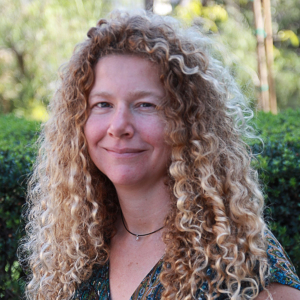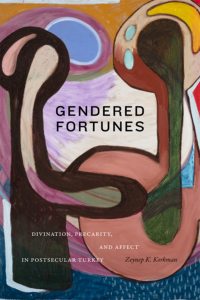Welcome to 7 Questions, our series where we highlight exciting scholars in the field of religion and get to know the person behind the book. For this article, we interviewed Zeynep Korkman, whose book Gendered Fortunes: Divination, Precarity, and Affect in Postsecular Turkey was published with Duke University Press this April. You can check out our excerpt of it here.
Get to Know Zeynep

Zeynep K. Korkman is an assistant professor of Gender Studies at UCLA. Her research interests include transnational feminisms; affect, labor, and intimacy; and religion, secularism, and the public sphere in Turkey and the larger Middle East. Korkman’s work has appeared in European Journal of Cultural Studies, Feminist Studies, Gender and Society, the Journal of Middle East Women’s Studies, the Journal of Ottoman and Turkish Studies, and Meridians.
Zeynep Answers Our 7 Questions
Question 1: What sparked the idea to write this book?
I was inspired by the curiosity and ambiguity I felt about fortunetelling. I first visited a fortunetelling business in 2002 in my hometown of Istanbul in Turkey. I had just taken the Graduate Record Exam in support of my application to doctoral programs in the United States, and was feeling as hopeful as anxious about what might be next. When I saw a café advertising fortunetelling, I found myself walking in. I would later learn that this café was one of the many similar businesses which hosted women and young and gay men as their workers and clientele. I cannot remember much of what the middle-aged female reader told me that day. I clearly remember my mixed feelings though. I felt validated when she accurately predicted some of the challenges I then experienced; but I was also annoyed that her version of my future revolved centrally around a husband and children. While I loved how she empathized with and encouraged me, I felt uneasy that I was purchasing this intimate encounter from a meagerly compensated, poorer woman. Furthermore, I had conflicted feelings about my enjoyment of this interaction, which was too “superstitious” for my secular sensibilities and too normatively “feminine” for my feminist sensibilities. The sense of inner conflict and subsequent curiosity I had following this first encounter motivated the research this book is based on. In the book, I untangle the broader context of my personal feelings by analyzing this gendered niche of fortunetelling as symptomatic of the broader contradictions of gendered politics of religion and secularism in Turkey and beyond.
Question 2: What role does the sacred play in relation to your work broadly? Where do you see the sacred or sacred things in this book specifically?
I take a genealogical, ethnographic, and affective approach to the category of sacred, or more precisely in my research, to the co-constituted categories of the religious, the superstitious, or the secular. I examine these as historically situated, context-specific, and affectively laden constructs. My book’s subjects are secular Muslim women and young and gay men of 2000s Turkey who work as fortunetellers. They navigate an ongoing heritage of early 20th century top-down secularism which despised and criminalized a whole array of religious practices and institutions, including fortunetelling. They also navigate the ongoing rule of AKP, Turkey’s Islamist ruling party of the last twenty years which disdains and marginalizes what it deems unruly engagements with religion, including fortunetelling. In this context, fortunetellers featured in my book resist the affective and economic devaluing of their work by claiming non-pious and secular Muslim identities, if seemingly ironically, through their engagements with fortunetelling. They perform fortunetelling, which is deemed superstitious by secularist and Islamist political imaginaries alike, in ways that seek to transcend the longstanding dichotomy of religious/secular. They describe fortunetelling as a process of feeling (hissetmek), a secularized yet enchanted idiom that resonates well with the more recently popularized new age as well as longer standing Sufi Islamic sensibilities of their clients. They quote the famous saying, “one should not believe in fortunetelling but should not refrain from it either,” articulating a peculiar combination of skepticism and practice that is fitting for their secular Muslim sensibilities. They situate the kinds of fortunetelling they provide, like reading coffee residues or tarot cards, in a feminized realm of everyday sociability and intimacy and distinguish them from the kinds the foretelling provided by (often male) Islamic practitioners called hodjas, who read fortunes and provide healing with the help of jinns (supernatural creatures). In short, in this book, engagements with the sacred are situated tightly within the affective and everyday workings of feminized, secular Muslim life-worlds and under the shadow of political projects that criminalize and stigmatize them.
Question 3: If you were to describe the book to someone who is unfamiliar with religious and academic jargon, how would you summarize it?
Women in Turkey have long been reading each other’s fortunes from coffee residues left at the bottom of a ground-rich cup of Turkish coffee in the privacy of their homes to offer each other emotional support and joy. In the 2000s, women were joined by young and gay men to read the residues, this time commercially in new businesses called fortunetelling cafés. Here, women and LGBTIQ folks worked informally to earn modest livelihoods amidst widespread unemployment and poverty. They also worked under an almost-century-old secularist law that made commercial fortunetelling a criminal offense and under stigmatization from a now-two-decades old Islamist government. While reading fortunes is commonly thought as a charlatanry at worst and meaningless entertainment at best, I argue that it is a way of caring for others and helping them articulate their hopes and fears through the occult language of fortunetelling. Inspired by fortunetellers who emphasize what they do is “feeling,” I call fortunetelling “feeling labor,” an enchanted but devalued effort to feel others and to make them feel. By helping folks feel and articulate their wants and needs, fortunetelling creates precious opportunities for women and LGBTIQ people whose wishes and anxieties are often not voiced in mainstream public debates. However, this happens only at the expense of exploitation and even criminalization of poorer women and gay men, who read the fortunes of their more socioeconomically advantaged counterparts at fortunetelling cafés.
Question 4: Who were models or inspirations for you as you wrote this book?
I was inspired by feminist works that situate feminized and affective engagements with the supernatural at the very heart of an analysis of gendered labor. For example, Silvia Federici’s Caliban and the Witch: Women, the Body and Primitive Accumulation (2004) provides a historical analysis of how the persecution of witches accompanied the relegation of women to unpaid housework during the emergence of capitalism in early modern Europe. Aihwa Ong’s Spirits of Resistance and Capitalist Discipline: Factory Women in Malaysia (2010) offers an ethnographic study of the spirit possession-induced seizures through which female Malay factory workers experienced and negotiated their enlistment into the ranks of the late modern proletariat. Attiya Ahmad’s Everyday Conversions: Islam, Domestic Work, and South Asian Migrant Women in Kuwait (2017) examines South Asian migrant women’s conversions to Islam that mediate their domestic labors in the Kuwaiti households they take work. These works provided me with an impetus to center the often dismissed engagements of women with the supernatural at the heart of scholarly research and a model for analyzing such micro-level gendered practices as a window into macro-level social formations such as secular modernity and capitalism.
Question 5: What was the most difficult thing about writing the book? Did you encounter any unexpected problems or challenges?
I was surprised and challenged to see how centrally and intimately the data and analysis featured my own life and feelings. Given the often private nature of fortunetelling sessions added by my intention to attend to the affective, the research and writing frequently took an autoethnographic turn. The book included several anecdotes from the fortunetelling sessions I received and the predictions and conversations about the familial and romantic predicaments I (potentially or presently) experienced. As a feminist scholar and ethnographer, I did expect to discuss my positionality and active role in the field, but it was still hard to navigate the distance between the intimate voice I was socialized into in the research context and the public voice I cultivated for the book’s audiences.

Question 6: What has surprised you the most about the book, either in its writing or reception?
An academic study about fortunetelling was unintelligible to many in and outside the academia. I encountered dismissal and skepticism within my familial, national, and academic communities both in the United States and Turkey. Some people challenged me to disclose whether I actually believed in such things and invited me to admit that fortunetellers were fakes. Such assertively and publicly made demands to disenchant and rationalize fortunetelling however were also accompanied by quieter, privately offered remarks that expressed curiosity and intimacy. Time and again, someone approached me to share how, even as they do not believe in fortunetelling, they have a story I need to hear about this one fortuneteller who exactly hit the mark. Some people asked for recommendations for good readers. The mixed feeling expressed in these contradictory attitudes were familiar and had inspired this research in the first place, but navigating them in academia was more challenging than I could have anticipated. Nor could I have foreseen the ethnographic conversions I myself would go through, including how much observation and conversation in the field it would take for me to finally become able to see and appreciate the labor involved in fortunetelling and how I myself would develop “feelings” so to speak and start to read the residues. In other words, secular biases against and an unwillingness and inability to value fortunetelling as a gendered practice and an academic object of study posed not only external but also internal challenges to navigate.
Question 7: With this book done, what’s up next for you?
While writing a book about the gendered and affective lives of religion and secularism in Turkey, I have been living as an immigrant woman from a Muslim Middle Eastern county in the post 9-11 United States. As a feminist scholar, I felt compelled to understand and respond to this different yet interrelated constellation of gendered politics of religion. I have recently coedited, with my colleague Sherene H. Razack, a special journal issue on “Transnational Feminist Approaches to Anti-Muslim Racism” (Meridians 20 (2), 2021) (https://www.dukeupress.edu/transnational-feminist-approaches-to-anti-muslim-racism).
In the same vein, in a forthcoming article entitled “(Mis)Translations of the Critiques of Anti-Muslim Racism and the Repercussions for Transnational Feminist Solidarities” (Meridians 22(2), Fall 2023), I delve into the challenges of scholarship and activism around issues of religion and secularism that seeks to understand and even build solidarity across different contexts in which gendered politics of religion may unfold in interrelated but distinct ways.
Finally, in my new research, I am continuing my inquiry into the intersections of gender, affect, labor, religion, and secularism with a focus on feminist solidarity with refugee and immigrant women in Turkey. I am intrigued by affective and laborious processes by which solidarity is brokered in and through religious, sectarian, national, ethnic, racial, linguistic, and economic differences, in particular between Turkish feminists and Syrian refugees.
You can order Gendered Fortunes: Divination, Precarity, and Affect in Postsecular Turkey here.
